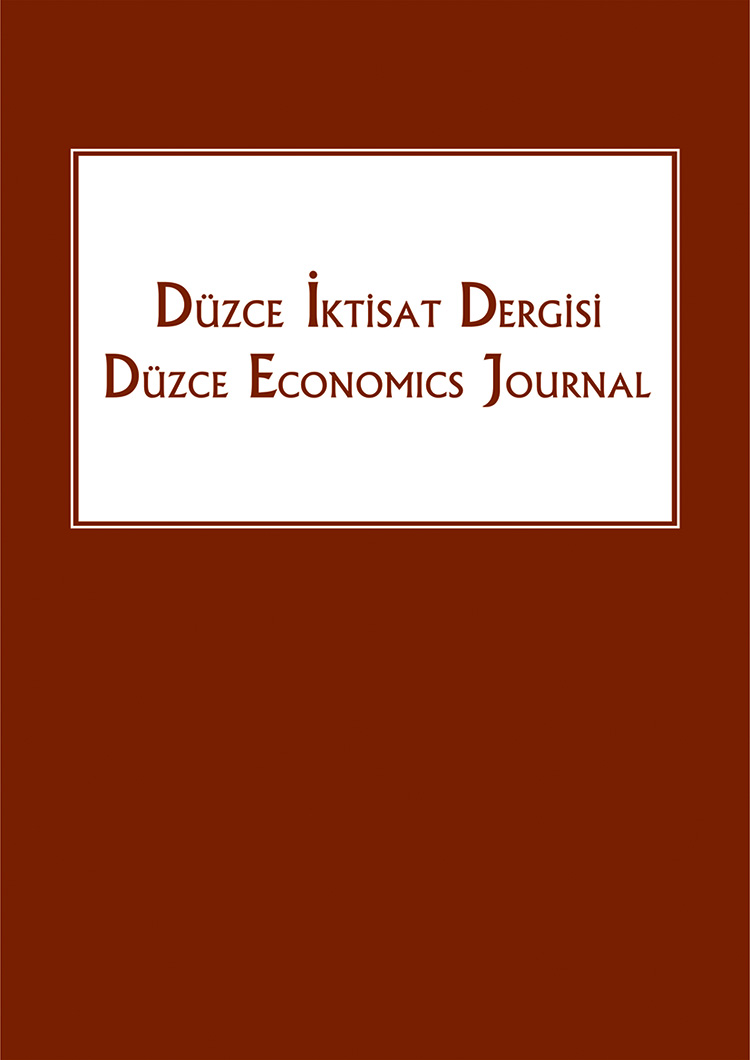Araştırma Makalesi | Açık Erişim
Düzce İktisat Dergisi 2022, Clt. 3(1) 1-7
Frequency Domain Causality Analysis of the Energy- Economic Growth Relationship for Turkey
ss. 1 - 7
Yayın Tarihi: Mart 29, 2022 | Görüntüleme Sayısı: 94/492 | İndirilme Sayısı: 133/1.110
Özet
Energy, which we can show as one of the basic elements of production, is a phenomenon that is emphasized today as it has been in every period of history. Since energy is an indispensable part of the production process, we come across as an important factor in the economic growth of countries, and with this feature, it has been the subject of many studies in the economics literature. The aim of this study is to test the causality relationship between energy and economic growth in Turkey. In this study covering the period between April 2016 and March 2021, the data on the monthly total electricity consumption representing the energy variable and the monthly industrial production index representing the economic growth are analysed with the frequency domain causality analysis method, and whether there is a causal relationship between the variables is examined in the short, medium and long term. According to the results of the analysis, while a unidirectional causality relationship is found from economic growth to energy consumption in the medium and long term, there is no evidence of a causal relationship from energy consumption to economic growth in any term.
Anahtar kelimeler: Turkey, Industrial Production Index, Electricity Consumption, Frequency Domain Causality Analysis
APA 7th edition
YILDIZ, U. (2022). Frequency Domain Causality Analysis of the Energy- Economic Growth Relationship for Turkey. Düzce İktisat Dergisi, 3(1), 1-7.
Harvard
YILDIZ, U. (2022). Frequency Domain Causality Analysis of the Energy- Economic Growth Relationship for Turkey. Düzce İktisat Dergisi, 3(1), pp. 1-7.
Chicago 16th edition
YILDIZ, Umit (2022). "Frequency Domain Causality Analysis of the Energy- Economic Growth Relationship for Turkey". Düzce İktisat Dergisi 3 (1):1-7.
Akarca, A. & Long, T. V. (1980). On the relationship between energy and gnp: a reexamination. Journal of Energy and Development, 5, 326– 331.
Altinay, G. & Karagol, E. (2005). Electricity consumption and economic growth: evidence from Turkey. Energy Economics, 27(6), 849-856.
Aqeel, A. & Butt, M.S. (2001). The relationship between energy consumption and economic growth in Pakistan. Asia-Pacific Development Journal, 8(2), 101-110.
Arora, V. & Shi, S. (2016). Energy consumption and economic growth in the United States, Applied Economics, 48(39), 3763-3773.
Aydın, M. (2020). Enerji tüketimi- ekonomik büyüme ilişkisi: Türkiye için frekans alanında nedensellik yaklaşımı. Erciyes Üniversitesi İktisadi ve İdari Bilimler Fakültesi Dergisi, 56, 83-96.
Breitung, J. & Candelon, B. (2006). Testing for Short and Lon Run Causality: A Frequency Domain Approach. Journal of Econometrics, 132(2), 363-378.
Cheng, S. B. & Lai, T.W. (1997). An ınvestigation of cointegration and causality between energy consumption and economic activity in Taiwan province of China. Energy Economics, 19, 435– 444.
Erbaykal, E. (2008). Disaggregate energy consumption and economic growth: evidence from Turkey. International Research Journal of Finance and Economics, 20, 172-179.
Erdal, G., Erdal, H. & Esengün, K. (2008). The causality between energy consumption and economic growth in Turkey. Energy Policy, 36(10), 3838-3842.
Erol, Ü. & Yu, E. S. H (1987). On the causal relationship between energy and ıncome for ındustrialized countries. Journal of Energy and Development, 13, 113-122.
Ertuğrul, H. M. (2011). Türkiye’de elektrik tüketimi büyüme ilişkisi: dinamik analiz. Enerji, Piyasa ve Düzenleme, 2, 49-73.
Esen, Ö. & Bayrak, M. (2017). Does more energy consumption support economic growth in net energy-ımporting countries? Journal of Economics, Finance and Administrative Science, 22(42), 75-98.
Geweke, J. (1982). Measurement of linear dependence and feedback between multiple time series. Journal of The American Statistical Association, 77 (378), 304-313.
Granger, C. W. J. (1969). Investigating causal relations by econometric models and cross-spectral methods. Econometrica, Econometrica, 37(3), 424-438.
Hamilton, J. D. (1983). Oil and the macroeconomy since World War II. The Journal of Political Economy, 91(2), 228-248.
Korkmaz, Ö. & Develi, A. (2012). Türkiye’de birincil enerji kullanımı, üretimi ve Gayri Safi Yurt İçi Hasıla (Gsyih) arasındaki ilişki. Dokuz Eylül Üniversitesi İktisadi ve İdari Bilimler Fakültesi Dergisi, 27(2), 1-25.
Kraft, J. & Kraft, A. (1978). On the relationship between energy and gnp. Journal of Energy and Development, 3, 401-403.
Narayan P. K. & Smyth, R. (2008). Energy consumption and real gdp in G7 countries: new evidence from panel cointegration with structural breaks. Energy Economics, 30, 2331-2341.
Ouedraogo, N.S. (2013). Energy consumption and economic growth: evidence from the economic community of West African States (ECOWAS), Energy Economics, 36, 637-647.
Özata, E. (2010). Türkiye'de enerji tüketimi ve ekonomik büyüme arasındaki ilişkilerin ekonometrik incelemesi. Dumlupınar Üniversitesi Sosyal Bilimler Dergisi, 26.
Paul, S. & Bhattacharya, R.N. (2004). Causality Between energy consumption and economic growth in India: a note on conflicting results. Energy Economics, 26, 977-983.
Payne, J. E. (2009). On the dynamics of energy consumption and output in the US. Applied Energy, 86, 575-577.
Savaş, B. ve Durğun, B. (2016). Elektrik tüketimi ile ekonomik büyüme arasında nedensellik ilişkisi: Türkiye örneği. Dicle Üniversitesi İktisadi ve İdari Bilimler Fakültesi Dergisi, 6(11), 213-244.
Soytas, U. & Sari, R. (2003). Energy consumption and GDP: causality relationship in G-7 countries and emerging markets. Energy Economics, 25(1), 33-37.
Stern, D. I. (1993). Energy use and economic growth in the USA, a multivariate approach. Energy Economics, 15(2), 137-150.
Stern, D. I. (2000). A multivariate cointegration analysis of the role of energy in the US macroeconomy. Energy Economics, 22, 267-283.
Yenilmez, F. & Erdem, M. S. (2018). Türkiye ve Avrupa Birliği’nde ekonomik büyüme ile enerji tüketimi arasındaki ilişki: Toda-Yamamoto nedensellik testi. Eskişehir Osmangazi Üniversitesi Sosyal Bilimler Dergisi, 19(1), 71-95.
Yıldırım, E., Saraç, Ş. & Aslan, A. (2012). Energy consumption and economic growth in the USA: evidence from renewable energy, Renewable and Sustainable Energy Reviews, 16(9), 6770-6774.
Yu, E. S. H. & Choi, J. P. (1985). Causal relationship between energy and gnp: an ınternational comparison. Journal of Energy and Development, 10(2), 249-272.
